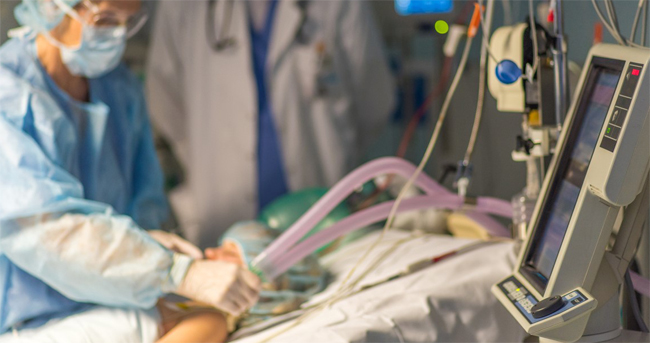The arrival of COVID19 has propelled cardio-respiratory physiotherapists particularly those working in intensive care units into the spotlight on the global stage.
Early preparations in New Zealand had these essential workers standing by and ready to provide acute care and to up-skill those in ICU teams.

The term 'cardio-respiratory physiotherapy' covers the entire spectrum of work, from acute to primary care and community services along with active ICU engagement, and while their role may have been misunderstood, this aspect of physiotherapy is considered so vital that these highly skilled physios have long been required to provide seven-day service often in emergency situations.
The School of Physiotherapy's Sarah Rhodes is testimony to the diversity of roles played by the cardio-respiratory physiotherapist.
Skilled and standing by
She operates in both acute and community settings and takes every opportunity to help raise the profile of her speciality.
Sarah is secretary of the Physiotherapy New Zealand's cardio-respiratory special interest group or SIG, and her team can be found hard at work behind the scenes throughout the various phases and levels of COVID19. Since the arrival of the virus Sarah's team has reviewed and communicated a large amount of emerging COVID19 research data and findings to their special interest group nationwide membership. Their prompt effective actions have helped our country manage responses better than most.
Anticipating a huge rehabilitation burden if the first wave of COVID19 had gained a foothold hold in our communities, Sarah and the team developed and distributed a range of advisory materials to GPs and NGOs, and reminded them that a skilled cardio-respiratory physiotherapy workforce was standing by for work in theatre, and to help manage recognised post-COVID19 symptoms such as fatigue, breathlessness and muscle weakness.
Aerosol-generating procedures
With SIG members finding it difficult to access appropriate personal protective equipment - and the risk of compromising either their health or patient care, Sarah and her team advocated for members and liaised with the Ministry of Health to have necessary respiratory techniques recognised as aerosol-generating procedures.
Many cardio-respiratory physiotherapy techniques involve forced expiratory breaths which are likely to generate aerosol-particles so specific respirator masks must be worn to minimise the risk of virus transmission.
Cardio-respiratory physiotherapists are often compelled to work closely with patients for prolonged periods, and were finding themselves in a difficult ethical position. Should physiotherapists risk their own health or stop delivering optimal care to their probable or confirmed COVID-19 patients? Beyond immediate health considerations, the likely deterioration of patient's health and increased duration of stay would have obvious financial implications for healthcare providers.
Building better understandings
Cardio-respiratory physiotherapy may currently suffer from image problems, and a reputation among colleagues for “loving sputum” is unhelpful. Yet, as the arrival of COVID19 has highlighted, cardio-respiratory physiotherapists are critically important to our healthcare system.
The critical role they play may not be entirely understood within some echelons of the healthcare community, yet with the support and collaboration of others, Sarah Rhodes at the University of Otago is doing everything possible to ensure that the profile of cardio-respiratory physiotherapy continues to be raised and achieves much wider recognition.
Guest contributor Sarah Rhodes holds a BSc (Hons) from the University of Northumbria in Newcastle (England) and is completing her PhD at the School of Physiotherapy, where she also works as a Professional Practice Fellow. Sarah is secretary of the Physiotherapy New Zealand Cardio-Respiratory Special Interest Group and the Allied Health representative on the Thoracic Society (TSANZ) New Zealand executive committee. She sits on the Executive Committee of the New Zealand branch of the Thoracic Society (TSANZ), as the Allied Health representative; she promotes the physiotherapy profession among medical colleagues and helps ensure a physiotherapy voice in nationwide respiratory initiatives.
Useful links
Sarah's SIG was also a key contributor to the Ministry of Health document: Guidance for the rehabilitation of people with or recovering from COVID-19 in Aotearoa New Zealand.
Newsroom article by Dr Margot Skinner on reducing the risk of COVID19 related deaths
